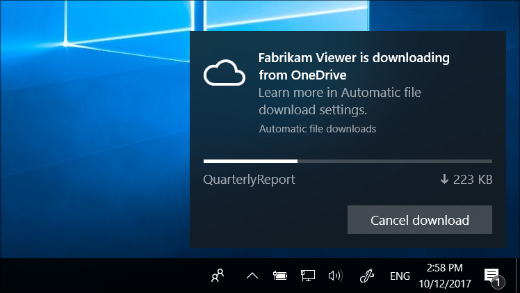Automatic file download notifications in Windows
Applies To
When you use an online storage provider such as OneDrive to store online-only files, some Windows apps might download these files automatically. For example, a music player app such as Windows Media Player might download your online-only music files to play them.
When an app downloads online-only files, you'll get a notification that shows where it's downloading them from and how many it's downloading, as well as the download progress.
When you get these notifications, do one of the following:
-
Do nothing, or dismiss the notification: If the download is expected and all's well, let the notification go away on its own after the download completes. Or, select the arrow in the upper right of the notification to move it to action center.
-
Cancel the download: To put the brakes on a download that's already started, select Cancel download, then select Cancel download again to confirm.
How to block automatic app downloads
Select Cancel download > Block app to cancel the download and block the app from downloading online-only files again in the future.
Note: Blocking apps could make them unstable. If you trust an app and open online-only files with it frequently, don't block it.
How to unblock automatic app downloads
If you block any apps from downloading online-only files and you change your mind later, to unblock them, go to your automatic file download settings.
Go to automatic file download settings
Tip: Don't want notifications for automatic file downloads? Go to your notifications settings and then, under Get notifications from these senders, turn off Automatic file downloads.Go to notifications settings












